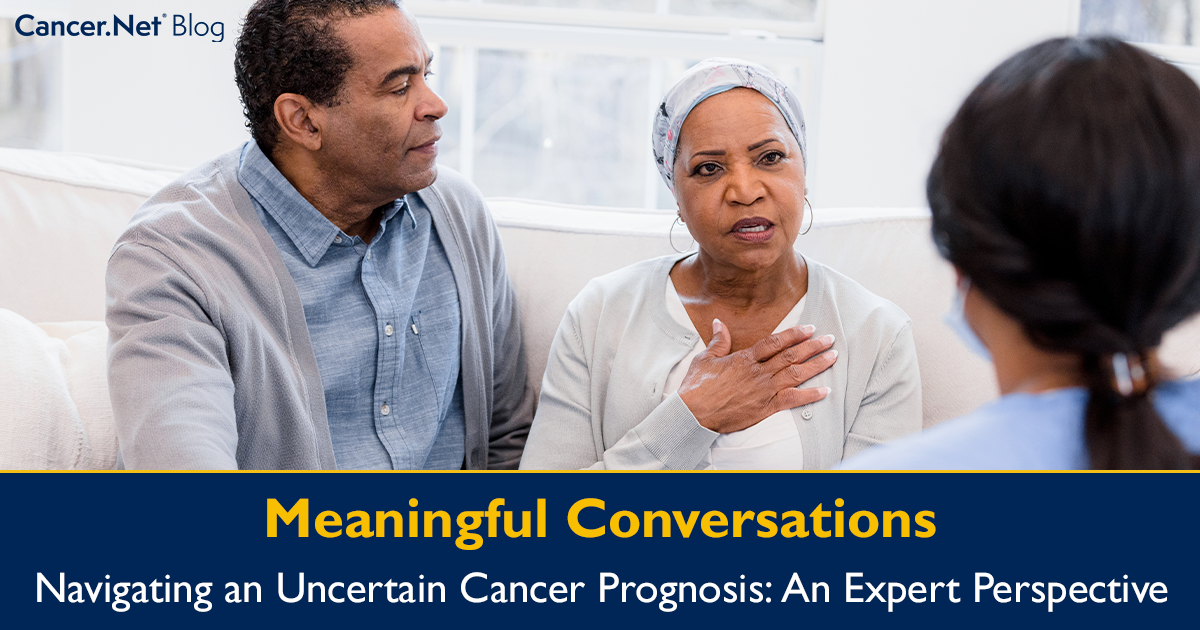
Meaningful Conversations is a Cancer.Net blog series that describes the important discussions people may need to have with their providers, caregivers, and loved ones during cancer and offers ways to help navigate these conversations. Anna Roshal, MD, is an Assistant Professor of Internal Medicine/Medical Oncology at Indiana University in Indianapolis, Indiana. Dr. Roshal is board certified in internal medicine, medical oncology, and hospice and palliative care. Dr. Roshal is also an advisory panelist on the 2023 Cancer.Net Editorial Board. View Dr. Roshal’s disclosures.
Receiving a cancer diagnosis can be an overwhelming experience. People with cancer and their families grapple with so many questions after a diagnosis, the most important of which are often about what is expected to happen in the future. This is commonly referred to as “prognosis.”
In medicine, prognosis is a term used for the predicted course of a disease. Meanwhile, the dictionary defines prognosis as “knowledge beforehand” of how a situation is likely to turn out. Doctors and patients commonly use the word “prognosis” to refer to an individual’s life expectancy, or how long the person is likely to live. However, prognosis can also refer to the chance that a disease can be cured. Or, it can be used when predicting the likelihood of functional recovery, ability to return to work or school, and/or the chance of a person experiencing certain long-term complications.
Coping with an uncertain cancer prognosis
Uncertainty is very common in cancer care. It starts from the time of diagnosis, when the doctor interprets the results of diagnostic tests, and continues through the process of trying to predict treatment responses and side effects. As cancer treatment has become increasingly complex, involving various treatment approaches that affect tumor growth and side effects in different ways, predicting outcomes and prognosis for each individual patient has become more difficult.
Uncertainty can be one of the hardest feelings to deal with during cancer. Some people may feel burdened and even emotionally overwhelmed by uncertainty around their prognosis, making them feel irritable, angry, and frightened. Such feelings can worsen your ability to make important treatment decisions and can even lead to poorer symptom management and poorer quality of life.
If you are dealing with uncertainty around your prognosis, it is important to know that you are not alone. These feelings are very common and even expected. If uncertainty is a major burden for you, it is important to communicate openly with your health care team and seek their advice and support. Acknowledging that you may always have some worry about what the future holds is also a good place to start. Focusing on what you can control right now rather than dwelling on “what ifs” is one way of managing your worries.
Talking with your doctor about an uncertain cancer prognosis
Clarifying available information and asking your doctor questions can be helpful when facing an uncertain cancer prognosis. However, you may find that your oncologist cannot answer some of your questions or that you are unsure of what their answers mean. Doctors have different ways of discussing prognosis, and they often rely on statistics when talking about prognosis with their patients. For some people, this may be difficult to understand and easy to misinterpret.
Despite your doctor’s best efforts, you may need to ask clarifying questions to feel comfortable that you are on the same page regarding your prognosis. It is important to understand what is and is not known, which may also help you regain a sense of control. Here are some questions that may be helpful to ask when discussing your prognosis with your doctor:
-
What are the best, worst, and most common outcomes of this diagnosis for people like me?
-
What is the overall goal of my treatment?
-
How will we know if I am getting better or worse?
-
How might my symptoms change over time during and after treatment?
-
What can I do to help myself feel better?
-
Where can I find help for dealing with fears, stress, and other feelings?
You can also ask your doctor about which tools and resources may be available to you to help in managing uncertainty around your prognosis, including:
Uncertainty is present throughout the cancer experience. It is important to keep in mind that open communication with your health care team—especially during times of transition, such as completing your treatment, moving on to a different treatment, or stopping treatment—can help you cope better.





